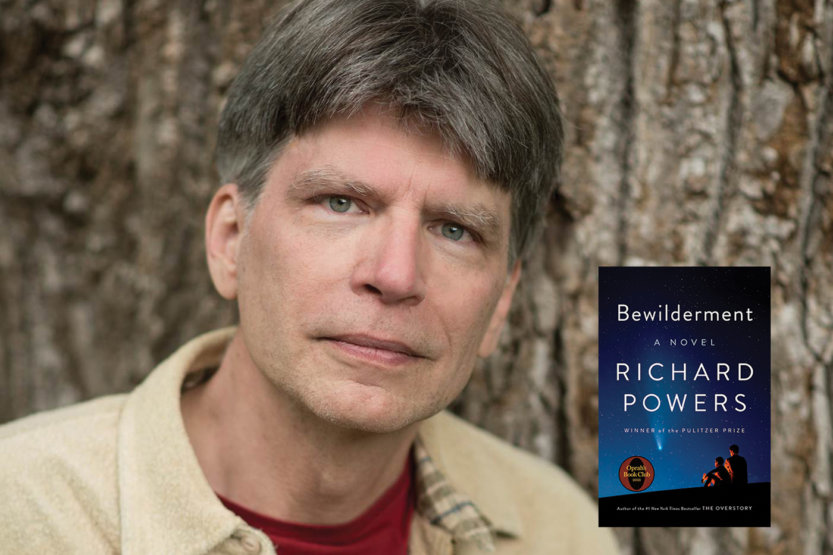Planet Hopping with Richard Powers
 In his follow-up to "The Overstory" (2018), novelist Richard Powers explores the meaning of life in the universe, through the eyes of a father and son. “It’s a miniature book where the miniatures are contemplating some of the largest questions that people ask.” (Image by Dean D. Dixon; Inset courtesy of W. W. Norton)
In his follow-up to "The Overstory" (2018), novelist Richard Powers explores the meaning of life in the universe, through the eyes of a father and son. “It’s a miniature book where the miniatures are contemplating some of the largest questions that people ask.” (Image by Dean D. Dixon; Inset courtesy of W. W. Norton) Through each of his 13 novels, Pulitzer Prize winner Richard Powers, ’78 LAS, MA ’80 LAS, has used the lenses of science, technology, history and the arts to explore what it means to be human. In Bewilderment (W.W. Norton, 2021), he goes one step further by using the small-scale story of a father and son to ask why life exists on Earth, and whether we’re alone in the universe.
Bewilderment has two main characters: Theo, a widowed astrobiologist who looks for life in the cosmos, and his son Robin, a neurodivergent third-grader who has trouble connecting with other people. One of the ways they connect with each other is through their nightly bedtime routine—telling stories about imaginary planets and the lifeforms that live there.
What inspired you to make imaginary planets an important part of the book?
In imagining the planets, Theo and Robin raise the most fundamental, most primal, most existential question that human beings have been asking since we evolved as a separate species: Are we alone, or is life everywhere? And what difference does that make to our own self-image?
What is a meaningful life? When we ask that question inside the confines of this essentially capitalist, individualist, exceptionalist culture that now dominates the world, we say meaning is something that each individual makes by themselves.
The planets are asking this larger question: Is there meaning out there? Does life as an aggregate, collective experience have meaning? Can we individuals find meaning by aligning our lives to that larger experiment? It’s precisely that attempt to migrate meaning out of the private self and into the shared experience of life that this book is about—finding the degree to which your life is not a separate thing but is intertwined [with] the lives of everything around you—that there is a shared adventure, and the biggest mistake you can make is to separate yourself from that.
Powers’ National Book Award for The Echo Maker (2006) is currently on display in the Richmond Family Welcome Gallery at Alice Campbell Alumni Center.

